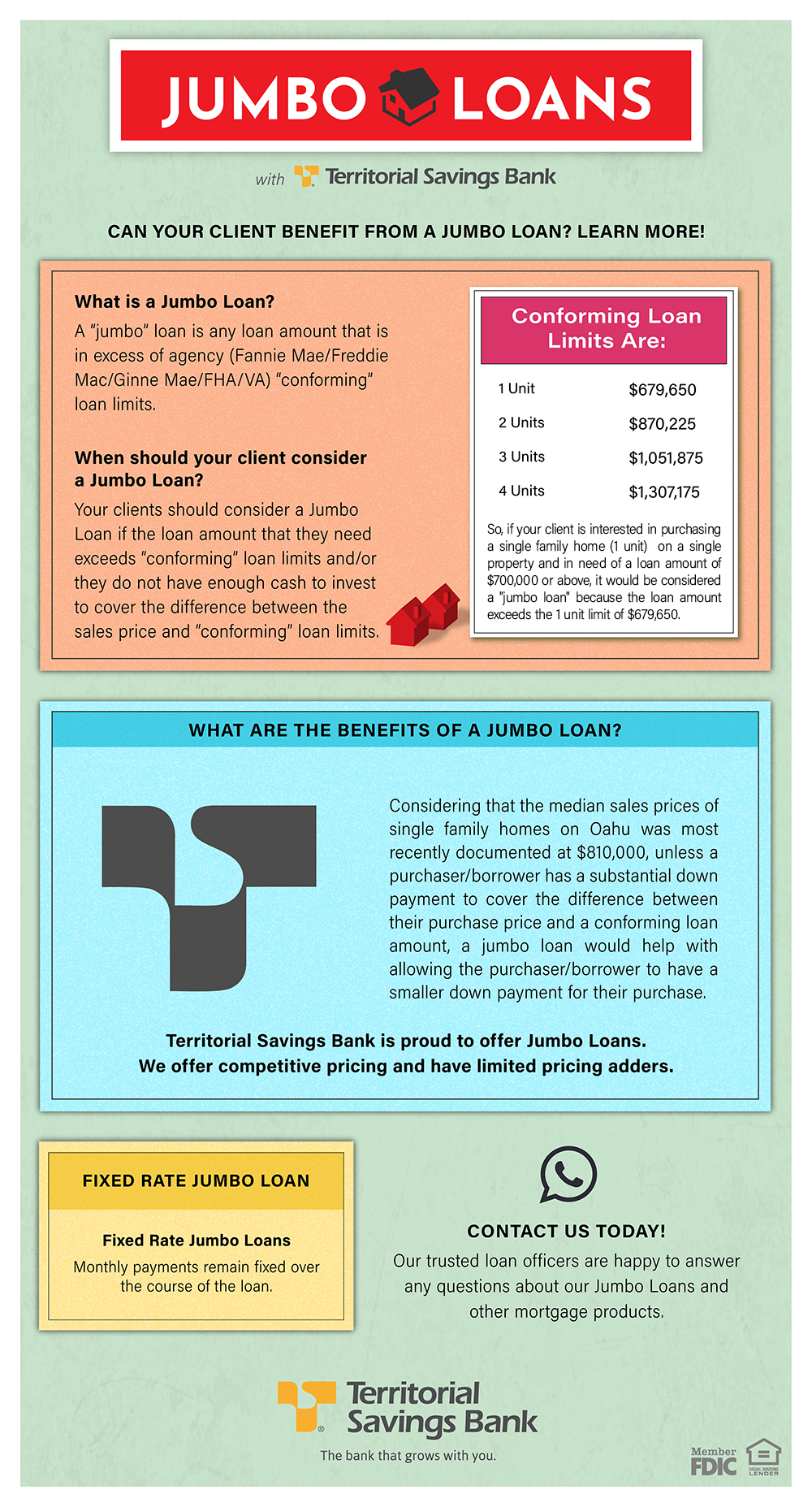Jumbo Loan: Just How to Get Larger Home Financing
Jumbo Loan: Just How to Get Larger Home Financing
Blog Article
The Impact of Jumbo Finances on Your Funding Options: What You Need to Know Before Using
Jumbo loans can play a critical duty in forming your funding options, particularly when it concerns obtaining high-value buildings. While they supply the possibility for bigger lending amounts without the concern of personal home mortgage insurance policy (PMI), they also come with stringent qualification criteria that require careful factor to consider. Recognizing the equilibrium in between the advantages and difficulties presented by these fundings is necessary for possible consumers. As you consider your alternatives, the ramifications of rate of interest rates and product availability may motivate you to reassess your economic method moving on (jumbo loan).
Recognizing Jumbo Fundings
Understanding Jumbo Loans calls for a clear understanding of their distinct features and demands. Jumbo finances are a sort of home loan that surpasses the conforming financing limits developed by the Federal Real Estate Finance Company (FHFA) These limits differ by place but normally cap at $647,200 in the majority of locations, making jumbo loans essential for financing higher-priced buildings.
One of the specifying functions of big lendings is that they are not qualified for acquisition by Fannie Mae or Freddie Mac, which brings about more stringent underwriting guidelines. Consumers should usually demonstrate a greater credit rating, generally above 700, and offer considerable paperwork of revenue and properties. In addition, lenders might require a bigger down repayment-- often 20% or more-- to reduce threat.
Interest rates on jumbo finances can be a little greater than those for adjusting fundings due to the enhanced danger presumed by the lender. The absence of personal home mortgage insurance (PMI) can offset some of these prices. Understanding these factors is important for prospective debtors, as they dramatically influence the terms and feasibility of securing a big lending in today's competitive realty market.
Benefits of Jumbo Finances
Jumbo financings supply distinctive benefits for property buyers seeking to buy high-value properties that go beyond standard funding limitations. One of the key advantages of jumbo finances is their capability to finance bigger amounts, enabling purchasers to acquire homes in premium markets without the restraints enforced by adhering financing limits - jumbo loan. This versatility makes it possible for property buyers to watch a more comprehensive series of residential properties that might much better match their requirements and choices
Additionally, jumbo financings usually come with competitive rate of interest, particularly for consumers with strong credit history accounts. This can result in significant cost savings over the life of the loan, making homeownership a lot more cost effective in the lengthy run. Moreover, big fundings can be customized to match specific financial scenarios, offering different terms and amortization alternatives that align with the debtor's objectives.

Challenges of Jumbo Fundings
Navigating the complexities of big fundings presents numerous challenges that potential consumers must know prior to continuing. One significant difficulty is the rigid loaning requirements enforced by monetary institutions. Unlike adjusting finances, jumbo loans are not backed by government-sponsored enterprises, leading lending institutions to adopt even more rigorous criteria. This frequently consists of higher credit history requirements and substantial documents to verify earnings and properties (jumbo loan).
In addition, big lendings usually feature greater rates of interest compared to conventional finances. This raised price can considerably impact monthly repayments and general price, making it essential for customers to meticulously assess their monetary circumstance. In addition, the down payment requirements for jumbo car loans can be considerable, typically varying from 10% to 20% or even more, which can be an obstacle for several possible home owners.
One more obstacle lies in the restricted schedule of big funding items, as not all lenders supply them. This can result in a lowered swimming pool of options, making it important for consumers to conduct extensive study and potentially seek specialized loan providers. Generally, recognizing these challenges is important for any individual taking into consideration a jumbo funding, as it makes certain enlightened decision-making and better financial planning.
Credentials Criteria
For those considering a jumbo financing, meeting the credentials standards is a crucial step in the application process. Unlike conventional financings, jumbo lendings are not backed by government agencies, causing more stringent needs.
To start with, a strong credit rating is important; most lenders require a minimal rating of 700. A higher score not only boosts your possibilities of approval but might likewise protect better rate of interest. Furthermore, borrowers are typically expected to show a considerable earnings to ensure they can pleasantly manage greater monthly repayments. A debt-to-income (DTI) ratio below 43% is typically chosen, with lower ratios being a lot more beneficial.
Down settlement requirements for big financings are likewise substantial. Customers need to anticipate putting down at the very least 20% of the building's purchase rate, although some lending institutions may use alternatives as reduced as 10%. Demonstrating cash money gets is essential; loan providers find more information often need evidence of sufficient liquid possessions to cover a number of months' well worth of home mortgage payments.
Comparing Funding Alternatives
When examining funding alternatives for high-value residential properties, recognizing the differences between different loan types is important. Big lendings, which go beyond conforming lending limitations, commonly come with stricter qualifications and greater rate of interest than standard loans. These lendings are not backed by government-sponsored business, which enhances the loan provider's risk and can result in much more stringent underwriting standards.
In comparison, standard loans offer even more adaptability and are typically simpler to obtain for borrowers with strong credit report accounts. They may come with reduced rate of interest rates and a bigger variety of choices, such as taken care of or variable-rate mortgages. In addition, government-backed financings, like FHA or VA car loans, provide possibilities for lower down payments and even more forgiving debt demands, though they also enforce limits on the lending quantities.

Conclusion
To conclude, jumbo finances existing both possibilities and challenges for potential property buyers looking for funding for high-value properties. While these lendings enable larger amounts without the concern of private mortgage insurance coverage, they include rigid certification demands and prospective disadvantages such as higher rates of interest. A complete understanding of the advantages and difficulties connected with jumbo finances is vital for making educated choices that straighten with long-lasting monetary objectives and objectives in the realty market.

Report this page